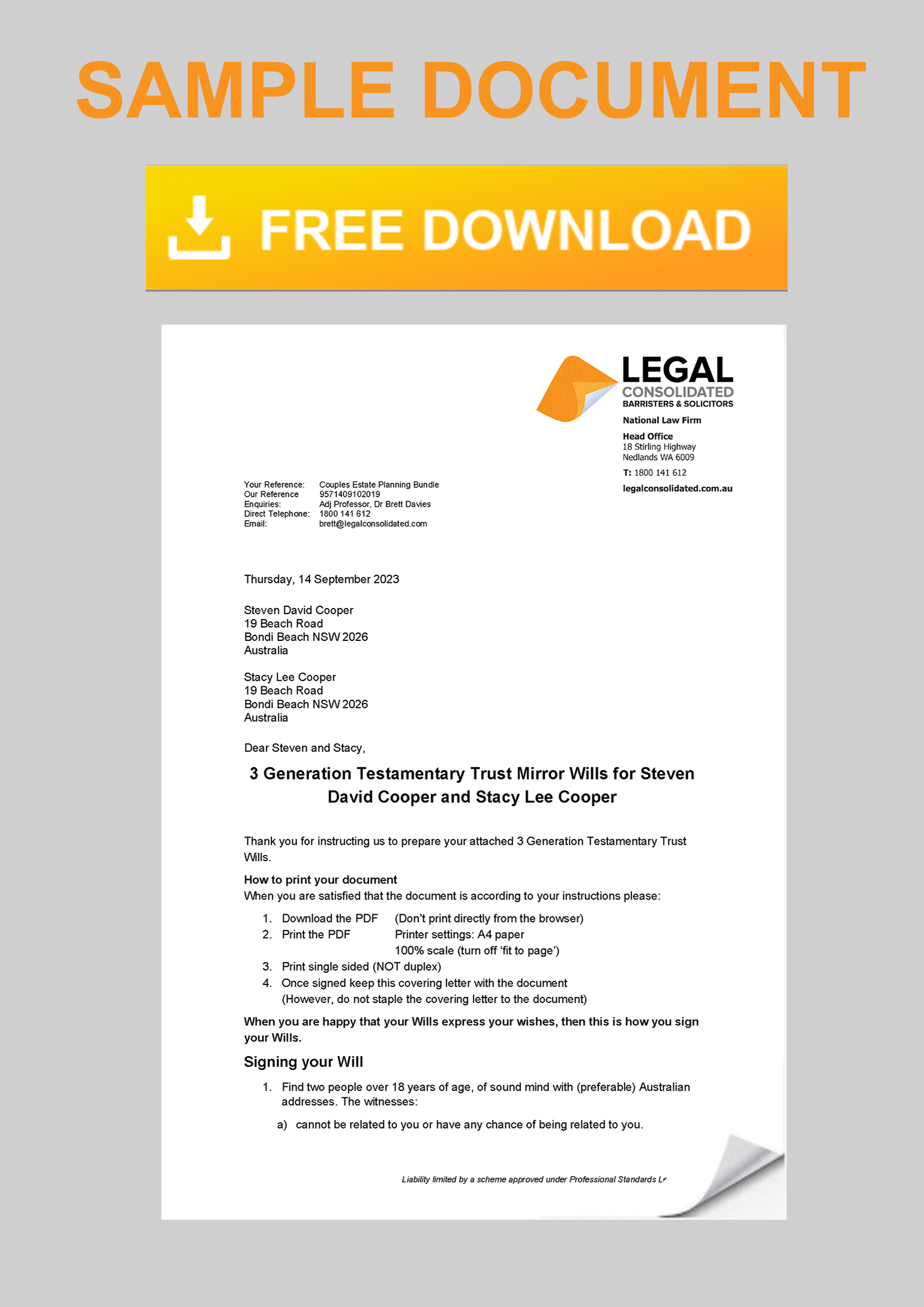Accountants’ Service Trust Agreement
It is common practice for accounting firms to utilise a service trust (or service entity). A service trust is often a:
- Family Trust – if just one accountant

- Unit Trust – if two or more accountants
- Company – not common as profit is trapped and no CGT relief. But useful if you have no family because of the 30% tax rate
Build these 3 types of Accountant’s service trusts on our website.f0
The Accountant Service Trust is a second business. The accounting service trust provides services to the accounting firm. It charges a fee for providing those services. The Accountant Service trust profits are shared with the accountant’s spouse, children and trusts. They pay tax at a lower marginal tax rate. Therefore, the accountant service trust saves tax. It helps with superannuation benefits and the spreading of income to the accountant’s family members.
But it is not enough to have just an accounting service trust. You need the agreement between the accounting firm and the service trust. This agreement is called an Accountants Service Trust Agreement. The Accountant Service Trust Agreement is a contract. It allows the service trust to supply equipment, staff, receptionist, premises and administration services to the accounting firm.
Accountant Service Trust Agreements are also popular for:
- Other professionals, such as engineers, doctors, dentists and lawyers, who cannot otherwise share profit easily.
- Asset protection – the accounting house holds the high-risk activities (employees, tenancies & advice) the other keeps all the ‘good’ assets (land, intellectual property, business name licence) in a low-risk entity.
(For example, the Accounting service trust registers a new business name. And 24 hours later licences it to the accounting practice. If the accounting practice goes bankrupt the accountant’s service trust takes back the business name and issues it to a new accounting house.) - Companies want to liberate wealth and move profit into a trust structure. Unlike a company, the service trust can access the CGT tax concessions. Therefore, the service trust often holds appreciating assets. These include real estate, franchises, copyrights and ‘leased out’ business names.

An Accountant Service Trust creates significant tax advantages by legitimately splitting the business’s income. Instead of the entire profit being taxed at the accountant’s high marginal tax rate, it’s redirected through a separate business entity (the service trust) and distributed to beneficiaries, like a spouse or adult children, who are in lower tax brackets. This lowers the overall tax paid by the family group.
Scenario 1: With an Accountant Service Trust
-
Accounting Firm’s Income:
-
Revenue:
$5,000,000 -
Less Service Fee to Trust:
-$3,700,000 -
Accountant’s Taxable Income:
$1,300,000
-
-
Service Trust’s Profit:
-
Service Fees Received:
$3,700,000 -
Less Trust’s Expenses (staff, rent, etc.):
-$2,000,000 -
Trust Profit to be Distributed:
$1,700,000
-
The Outcome: The total business profit of $3,000,000 ($1.3M + $1.7M) is split. The $1.7M trust profit can be distributed to multiple lower-taxed beneficiaries, drastically reducing the total tax bill compared to one person being taxed on the full amount.
Scenario 2: Without a Service Trust
-
Accounting Firm’s Income:
-
Revenue:
$5,000,000 -
Less Business Expenses (staff, rent, etc.):
-$2,000,000 -
Accountant’s Taxable Income:
$3,000,000
-
The Outcome: The accountant is personally taxed on the entire $3,000,000 profit. A huge portion of this would be taxed at the highest marginal rate (currently 47%, including the Medicare Levy), resulting in a much higher tax liability.
Key Advantages of an accounting house having a service trust
Income Splitting of an accounting house
This is the core tax benefit. The structure allows you to legally move profits from a high-income earner to family members with little or no other income. By using their lower tax thresholds, the total tax paid is minimised.
Asset Protection
Valuable business assets like computers, office furniture, and software licenses are owned by the trust, not the individual accountant. This separates the assets from the professional practice, offering a layer of protection from potential litigation against the accountant personally.
Wealth Management
The service trust acts as a separate vehicle to build and manage family wealth. Profits can be accumulated within the trust for future investment or used for purposes like funding adult children’s education or helping them enter the property market.
ATO Compliance is Essential when the accountant sets up a Service Trust
The Australian Taxation Office (ATO) watches these arrangements closely. For the trust to be compliant, it must operate as a genuine business.
-
Commercial Rates: The fees charged by the trust (
$3.7Min your example) must be at a commercial, market rate. You cannot inflate the fee to maximise the profit shifted. The ATO provides guidance (like ruling TR 2006/2) on what it considers reasonable. -
Documentation: A legally robust Accountant Service Trust Agreement is non-negotiable. It must clearly define the services provided and the terms of the arrangement.
-
Genuine Services: The trust must actually provide the services it charges for. It cannot be a “sham” arrangement set up only to avoid tax.
Accountant’s Personal Services Income
The accountant can’t share ‘personal services income’ (PSI). However, the accountant service trust ‘income’ is not personal services income. This is because the accountant service trust is a separate business from the accounting firm’s practice. The accountant service trust operates on an ‘arm’s length basis’. Therefore, the income is distributed to the spouse, children and other beneficiaries related to the accounting partners.
The Accountant Service Trust Agreement is a type of Independent Contractors Agreement
An Accountant Service Trust Agreement is a type of Independent Contractors Agreement (‘contract for services’).
The principal (accounting firm) requests and pays for the services. The person providing the services is the contractor (Accountant Service Trust). The agreement between the principal and contractor is the Accountants Service Trust Agreement.
- Accountant = principal
- Accountant Service Trust = contractor
- Accountant Service Trust Agreement = agreement
The contractor is ‘independent’. The contractor is not an employee of the principal (accounting firm).
What should the Service Trust charge?
Your accountant, each financial year, tells you what to charge. The Service Trust Agreement allows for this. You charge ‘market rates’. Treat the service trust as a separate, non-related business. The Service Trust Agreement allows the service trust to provide many services, including:
(a) plant and equipment (desks, chairs, accountant’s library, equipment)
(b) non-partner staff (build Employment Contracts here)
(c) consumables
(d) the office premises
(e) budgeting, forecast, bookkeeping, accounting and debt collection services
(f) marketing, corporate design and identity and brand awareness
(g) additional services — as agreed by the parties from time to time
How do I update the Accountants Service Trust Agreement?
The Agreement is updated by an exchange of emails. Add more services as your accountant suggests. You can add a scope of work, plans, diagrams and specifications.
The Service Trust Agreement is silent on what it charges the accounting firm. So that is never out of date. Your accountant advises you on what the appropriate charges are during the financial year.
How do I structure an accountant service trust?
For a one-person-owned accounting house:
- First, build a company as trustee for a family trust
- Secondly, once my lawyers have checked and incorporated the company then build a family trust deed
- Finally, build this Accountant Service Trust Agreement (press the Start Building button on the top of this page)
If you are two or more accountants owning the accounting practice consider a Unit Trust, instead of the Family Trust.
Help build your accountant service trust agreement
Start the free building process. It’s highly educational, you can telephone us for free legal advice, but answer as many questions as you can first.

